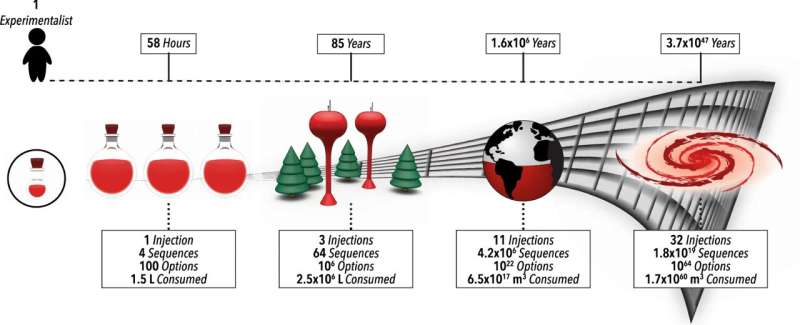This article has been reviewed according to Science X's editorial process and policies. Editors have highlighted the following attributes while ensuring the content's credibility:
fact-checked
peer-reviewed publication
trusted source
proofread
Self-driven laboratory speeds chemical discovery

A team of chemical engineering researchers has developed a self-driven lab that is capable of identifying and optimizing new complex multistep reaction routes for the synthesis of advanced functional materials and molecules. In a proof-of-concept demonstration, the system found a more efficient way to produce high-quality semiconductor nanocrystals that are used in optical and photonic devices.
"Progress in materials and molecular discovery is slow, because conventional techniques for discovering new chemistries rely on varying one parameter at a time using siloed operations in chemistry and materials science labs," says Milad Abolhasani, corresponding author of a paper on the work and a professor of chemical and biomolecular engineering at North Carolina State University.
"If a complex chemistry includes dozens of parameters, it might take decades to develop a new target material or a more efficient way to produce a desired chemical."
"Our system, called AlphaFlow, makes use of an artificial intelligence technique called reinforcement learning that—when coupled with automated microfluidic devices—expedites the material discovery process. We've shown that AlphaFlow can conduct more experiments than 100 human chemists in the same period of time, while using less than 0.01% of the relevant chemicals."
"It effectively miniaturizes the experiments and performs the same laboratory operations that would require an entire wet chemistry lab in a suitcase-sized end-to-end experimental platform. It's extremely efficient."
AlphaFlow's AI model makes decisions on what experiment to conduct next based on two things: the data it has developed from experiments it already ran and what it predicts the results of the next several experiments will be.
"We use this moving window of prior action steps and predicted outcomes of future action sequences to inform AlphaFlow's decision making. From this, AlphaFlow can account for actions with delayed effects and also pivot its decision making based on the most recent experimental outcomes in real time," says Amanda Volk, first author of the paper and a Ph.D. student at NC State. "Basically, the system is capable of immediately learning from and adapting to unexpected results."
This is true whether the system is focused on discovering a new chemical or optimizing the manufacturing process for a known chemical. The difference being that, for discovery, the system is trying to determine which precursors need to be added, as well as the best order in which to add them, in order to find a chemistry with the best performance.
Whereas for optimization, the AI model already knows which precursors need to be added, and in which order. As a result, AlphaFlow's focus for optimization is on determining what amount of each precursor is needed, as well as the amount of time needed for each reaction, to reach optimal performance most efficiently.
"This integration of AI and chemistry reduces the amount of time it takes to develop new chemistries by at least an order of magnitude," Abolhasani says. "Think on the order of hours, instead of months or years."
"AlphaFlow also offers new insights into fundamental chemistry," Volk says. "For example, in a proof-of-concept demonstration, AlphaFlow developed a new means of producing a semiconductor nanocrystal with a cadmium selenide core and cadmium sulfide shell. These nanocrystals are used in photonic and optical technologies. The new chemistry discovered by AlphaFlow has fewer steps than the prior human-discovered chemistry, making the process more efficient."
"Moreover, one of the steps that AlphaFlow eliminated was previously believed to be a key step in this type of multi-step chemistry, which came as a surprise. The fact that we can produce the same high-quality nanocrystal without that step broadens our understanding of the chemistry involved."
"Basically, AlphaFlow demonstrated that a step that human researchers thought was critical turned out to be unnecessary," Abolhasani says. "And it developed this more efficient chemistry, which changed what we thought we knew about the multi-step chemistry of core/shell semiconductor nanocrystals, in just 30 days of continuous operation vs. 15 years of academic literature."
At present, AlphaFlow is set up to conduct experiments related to colloidal atomic layer deposition. This type of multi-step chemistry is particularly challenging from an experimental standpoint, because it involves many different parameters—there can be more than 40 variables that need to be accounted for.
"However, AlphaFlow could be modified to conduct any range of experiments that involves performing chemical reactions in solution," Abolhasani says.
"AlphaFlow is the first example that we know of that integrates reinforcement learning with a self-driving lab," Volk says. "And it highlights the extent to which AI and the physical sciences can benefit from each other."
The researchers are now looking for partners in both the research community and the private sector to begin using AlphaFlow to address chemistry challenges.
"Ideally, we would like to reach a point where multiple AlphaFlow platforms are being used to address different large-scale challenges related to energy transition and sustainability, but are sharing data that will allow everyone to discover and develop new materials and molecules more quickly," Abolhasani says.
"AlphaFlow is open source. We think it's important to share high quality, reproducible, standardized, experimental data—from both the failures and the successes. We think this is important, because we want to accelerate discovery of new materials and chemical processes."
The paper appears in Nature Communications.
More information: "AlphaFlow: Autonomous Discovery and Optimization of Multi-Step Chemistry using a Self-Driven Fluidic Lab Guided by Reinforcement Learning" Nature Communications, DOI: 10.1038/s41467-023-37139-y. www.nature.com/articles/s41467-023-37139-y
Journal information: Nature Communications
Provided by North Carolina State University




















